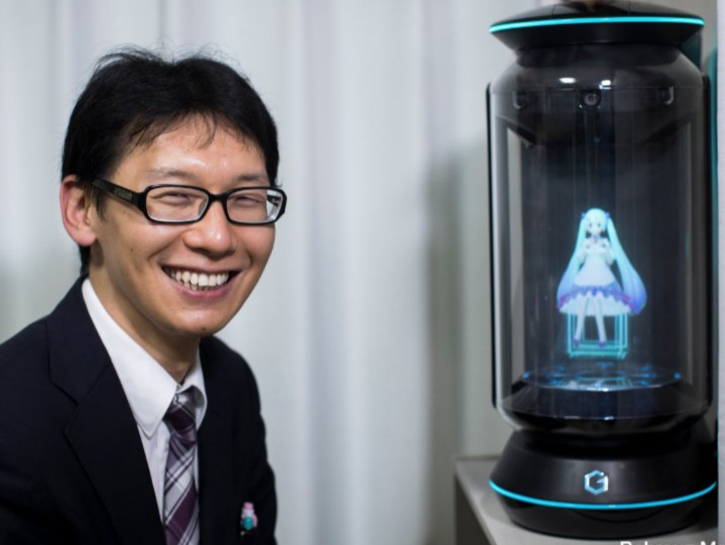Akihiko Kondo, a 35-year-old school administrator from Japan, recently got married to the love of his life in early November. The ceremony, held in Tokyo Hall, cost two million yen (the Japanese equivalent of $17,600) and featured about 40 guests in attendance. Absent for the ceremony was Kondo’s own mother, who did not approve of the marriage, supposedly because she would have preferred her son to tie the knot with a woman who was more… three-dimensional.
Crazy in love? The Japanese man 'married' to a hologram.
— AFP News Agency (@AFP) November 12, 2018
Akihiko Kondo, a school administrator, married a virtual reality singer called Hatsune Miku in early November. His mother refused to go to the wedding https://t.co/xD9jvGni2s pic.twitter.com/CURmO4b7YB
That is Kondo posing with his wife, Hatsune Miku, a 16-year-old holographic singer who lives in a $2,800 desktop device that projects her image within a cylindrical window. She was able to be physically present for the ceremony, however, in the form of a stuffed doll, which Kondo also shares his bed with.

“I’m in love with the whole concept of Hatsune Miku but I got married to the Miku of my house,” Kondo tells AFP News.
His “cross-dimensional” romance with Miku began over a decade ago after a history of romantic rejection by the opposite sex eventually led him to develop feelings for the virtual reality character, whose voice has been featured on over 100,000 songs released worldwide.
“Miku-san is the woman I love a lot and also the one who saved me,” Kondo adds.
Their marriage is not legally recognized in Japan, but it is certified by Gatebox, the company that manufactured Miku’s desktop capsule. That certification, which Gatebox has actually issued to thousands of “cross-dimensional” partnerships, and Kondo’s loyal devotion to Miku is enough for him to remain confident in their relationship. Yet, he is disappointed that more people cannot comprehend their love the way he can.
Kondo wishes to be recognized as a sexual minority, claiming that he has no interest, romantically, in “3D women,” adding that two-dimensional characters cannot cheat, age, or die. Therefore, when this school administrator is 60, his wife will still be just 16. He takes offense to those who have criticized him for his preference, including his mother, citing it as discrimination.
“It’s simply not right,”he says, “It’s as if you were trying to talk a gay man into dating a woman, or a lesbian into a relationship with a man… It won’t necessarily make you happy to be bound to the ‘template’ of happiness in which a man and woman marry and bear children.”

Furthermore, stronger than Kondo’s hope that society that will accept he and Miku’s romance is his hope that their dimensional barriers will one day be obsolete.
“For now, we can’t touch or hold a conversation with a virtual character yet,”he says, “but I think it’s just a matter of time before technology allows us to do so.”
What do you think? Should the world keep an open mind to “cross-dimensional” relationships or is this man’s fetish for a teenage virtual reality simulation simply unacceptable? Let us know in the comments below!
